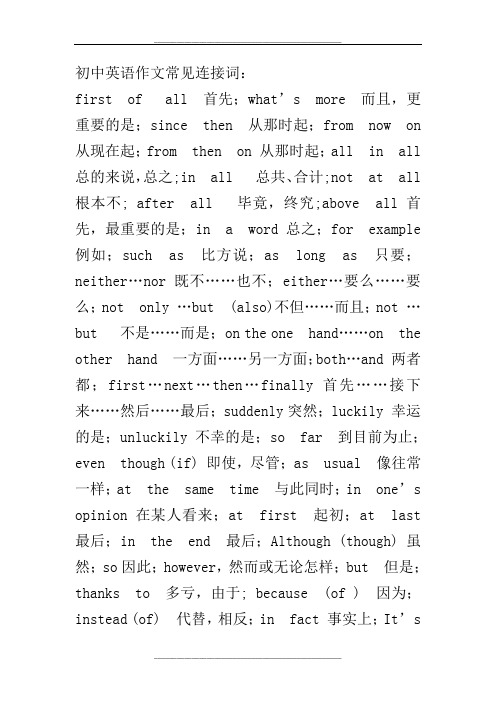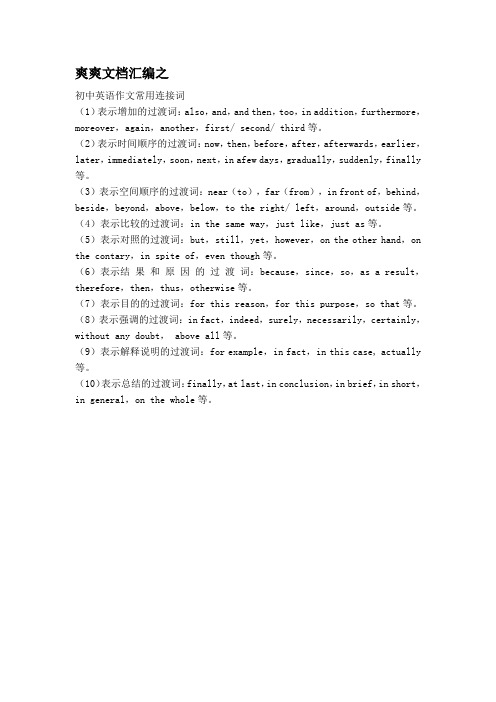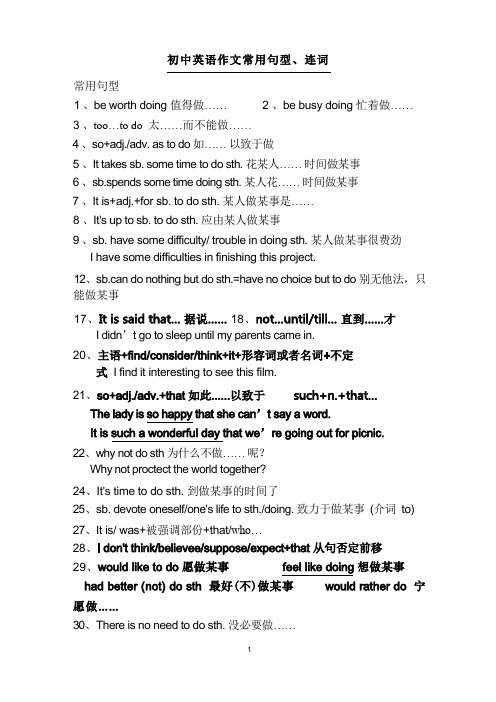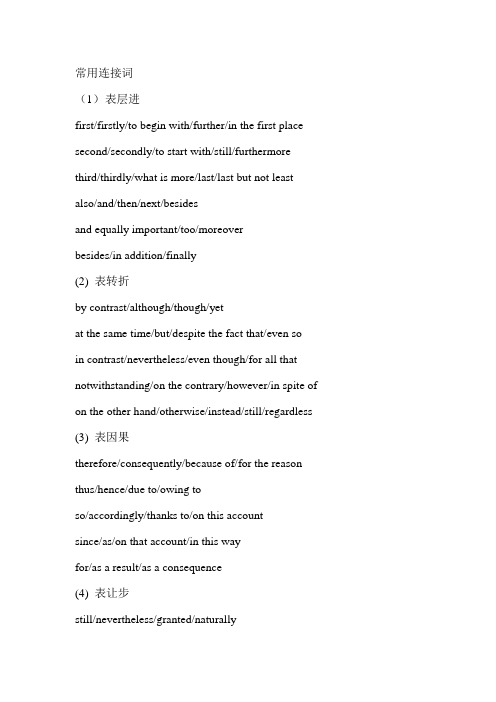初中作文常用连接词和短语
初中英语作文常见连接词

初中英语作文常见连接词:first of all 首先;what’s more 而且,更重要的是;since then 从那时起;from now on从现在起;from then on 从那时起;all in all 总的来说,总之;in all 总共、合计;not at all 根本不; after all 毕竟,终究;above all 首先,最重要的是;in a word 总之;for example例如;such as 比方说;as long as 只要;neither…nor既不……也不;either…要么……要么;not only …but (also)不但……而且;not …but 不是……而是;on the one hand……on the other hand 一方面……另一方面;both…and 两者都;first…next…then…finally 首先……接下来……然后……最后;suddenly突然;luckily 幸运的是;unluckily 不幸的是;so far 到目前为止;even though (if) 即使,尽管;as usual 像往常一样;at the same time 与此同时;in one’s opinion 在某人看来;at first 起初;at last 最后;in the end 最后;Although (though) 虽然;so因此;however,然而或无论怎样;but 但是;thanks to 多亏,由于; because (of ) 因为;instead (of) 代替,相反;in fact 事实上;It’ssaid (reported, known…) that 据说(报道,众所周知的是……);for this reason 因为这个原因;the reason why………的原因;not ……until 直到才;at present 现在,目前;according to 根据;as a result (of)结果是一常见的作文类型提纲模板:1.书信a书信开头常用语I am very glad to receive your letter (hear form you).Hello, Jane. Is everything going (on) well? /How is everything going (on)?(最近怎么样?)I’m writing to you for some advice on how to…(我正给你写关于...的建议的信)I’m writing to ask if you can ... (我想写信问你你是否能...)How time flies! It has been ..months/years since we last met.(光阴似箭,自从我们上次见面已经...月/年)Thank you for inviting me to …. (谢谢邀请我...)b 书信结尾常用语Best wishes (to/for you).Wish you good luck.(I am) looking forward to hearing from you.2 图表、数字比例型(提出讨论或调查的事实)Last week, our class had a class meeting on (ho w to)… Here are the results.(表达出不同看法或观点)Most students think … While … 20% of them choose to….Another 15 believe… There are also some… saying that…(表达个人看法)As a student, I agree to…3 说明利弊型(开头点题)Nowadays … is becoming more and more popular.(阐述利弊)It has many advantages . First, 优点1… Besides, 优点2…However, every coin has two sides. It also brings us bad influences. On the one hand, 缺点1… On the other hand, 缺点2…(个人观点)In my opinion,个人观点 ...4 不同观点型(开头提出观点)We made a survey about whether we should …提出矛盾问题.(分别揭示正反方的观点及其理由)Different people hold different ideas.Some believe …正方观点. First, 原因1… Besides, 原因2…While others don’t agree. They think…反方观点. On the one hand, 原因1… On the other hand, 原因2…(结尾)As for me,个人观点…(只选一方的观点)5 解决问题型(开头)Recently, the…problem has been more and more serious. We/people should do something to solve it.(解决方法)Firstly, 方法1… Secondly, 方法2… Finally, 方法3…(结尾)I am sure if everyone can make a contribution to …, the … will become bett er and better.。
(完整版)中考英语常用连接词以及写作方法总结

常用连接词:1.表文章结构顺序:First of all, Firstly/First, Secondly/Second…And then, Finally, In the end, At last2.表并列补充关系的:What is more, Besides, Moreover, Furthermore, In addition3.表转折对比关系的:However, On the contrary, butAlthough+clause(从句), In spite of+n/doingOn one hand… On the other hand…Some…, while others…4.表因果关系的:Because, AsSo, Thus, Therefore, As a result5.表换一种方式表达:In other words6.表进行举例说明:For example,句子;For instance,句子;such as+n/doing7.表陈述事实:In fact8.表达自己观点:As far as I know, In my opinion9.表总结:In short, In a word. In conclusion, In summary文中正确使用两三个好的句型,如:宾语从句、状语从句、动名词做主语等。
宾语从句举例:I believe Tianjin will be more beautiful and prosperous.状语从句举例:If everyone does something for the environment, our hometown will become clean and beautiful.动名词做主语举例:Reading books in the sun is bad for our eyes.It's bad for our eyes to read books in the sun.常用状语从句句型:1)时间:when, not…until, as soon as2)目的:so that+clause; to do(为了)3)结果:so…that+clause, too…to do(太……以至于……)4)条件:if, unless(除非), as long as(只要)5)让步:though, although, even though, even ifno matter what/when/where/who/which/how6)比较:as…as…, not so…as…, than叙事文常用的句子间连接词:At first; at last; in the end…then/next/after that…when/while/as soon as/not… until…at the same time; at times; once in a while;so thatTo one’s surprise/joyLuckily/fortunately/unluckily/unfortunately…in a word/in all议论文常用连接词表示并列:either…or; neither…nor; both…and; not only…but also;表示递进的:besides; what’s more; what’s worse; (moreover);表示原因的:because; for…; because of…; thanks to…; (for the reason that…);表示结果的:so; as a result; so…that…; therefore;表示目的的:so that…; in order that…; (in order) to…; for…;表示对比的:while; on the one hand + on the other hand; Each coin has two sides.; prefer…to…; would rather do…than do…;表示转折的:however; but;表示举例的:for example; for instance; such as…; like…; that is to say…表示总结的:in all/short; in a word; in brief/ total; last but not least; last;表示利弊的:be good/bad for sb.; be harmful to sb.; do harm to sb.; …have great/much influence on sb.; sth. benefit sb.; sb benefit from sth.; affect; have an effect on sb.;表示喜爱的:love/like/enjoy…; be fond of…; be interested in…; show great interest in…; lose oneself in…; put one’s heart into…;表达个人想法的:I think/believe…; (as) for me; in my opinion/view; as a student; from the bottom of my heart; personally;其他:in general; generally speaking; to be short; to be honest; to tell the truth; as we know; make up one’s mind to do; in a way;作文万能句:I will work hard to make my dream come true.I hope your dream will come true one day.It takes sb. +时间+to do…Sb. spend(某种人称时态)+时间/钱+on sth./ (in) doing sth.It’s important/necessary… for sb. to do…It’s time for sb. to do sth.It’s a waste of time to…It’s …years since sb. have/has +过去分词It’s great fun to do=sb. have great fun doingIt’s a pity that…It’s an honor to…There be …doing…Great changes have taken place in…sth is/are well worth doing.It seems/seemed that…It is said that…As the saying goes, ……and …. are different in many ways.There are many differences between … and …I have made up my mind to …I would rather …. than …It doesn’t matter if…If everyone can make a contribution to the earth/ nature/ society, our life will be better and better.1. 重点句型1). It is said that + 句子据说…It is reported that + 句子据报道…2). There is no doubt that + 句子毫无疑问…3). It goes without saying that + 句子不言而喻,毫无疑问4). There is no need to do 没必要做…5). There is no point in doing 做某事毫无意义6. as is known to all, +句子众所周知7). It’s adj for sb to do 做…对某人来说…8). … so … that … 如此… 以至于… … too … to do 太… 而不能…such … that … 如此… 以至于…9). not…until… 直到…才… 例:I didn’t go to bed until my mother came back。
超级实用初中英语作文常用连接词

爽爽文档汇编之初中英语作文常用连接词(1)表示增加的过渡词:also,and,and then,too,in addition,furthermore,moreover,again,another,first/ second/ third等。
(2)表示时间顺序的过渡词:now,then,before,after,afterwards,earlier,later,immediately,soon,next,in afew days,gradually,suddenly,finally 等。
(3)表示空间顺序的过渡词:near(to),far(from),in front of,behind,beside,beyond,above,below,to the right/ left,around,outside等。
(4)表示比较的过渡词:in the same way,just like,just as等。
(5)表示对照的过渡词:but,still,yet,however,on the other hand,on the contary,in spite of,even though等。
(6)表示结果和原因的过渡词:because,since,so,as a result,therefore,then,thus,otherwise等。
(7)表示目的的过渡词:for this reason,for this purpose,so that等。
(8)表示强调的过渡词:in fact,indeed,surely,necessarily,certainly,without any doubt, above all等。
(9)表示解释说明的过渡词:for example,in fact,in this case, actually 等。
(10)表示总结的过渡词:finally,at last,in conclusion,in brief,in short,in general,on the whole等。
英语作文中常用连接词和短语.doc

一.连接词(1)表选择关系或对等关系的连接词: either or ,neither nor, or, as well as , and, both and。
(2)表因果关系或对等关系的连接词: therefore, so, as a result, as the resultof ,because of, due to,owing to, thanks to 等。
(3)表时间顺序的连接词: the moment, as soon as, at first, then, later, mea nwhyle, at the beginning, in the end, before long, for the first ( second)ti me, the minute 等。
(4)表转折关系的连接词: yet, and yet, but , while, on the contrary, on theother hand, however, at the same time (然而)等。
( 5)表解释说明的连接词:that is, that is to say, in other words, such as, fo r instance, and so on, etc. and the like 等。
(6)表递进关系的连接词: not only but (also), what ,s more, what's worse, besides, in addition, worse still, moreover, above all 等。
( 7)表示总结的连接词:in a word, on the whole, in short, briefly, in brief, t o sum up, in all 等。
二.过渡词1、表示时间的af first 起初next 接下来then 然后after that 那以后later 后来soon 不久soon/shortly after之后不久finally 最后in the end 最后eventually 最终at last 终于lately 近来recently 最近since then 自从那时起after that 那以后in no time 不一会儿after a while 一会儿afterward 后来to begin/start with=in the first place 首先、第一点immediately 立即、马上meanwhile=in the meantime=at the same time 在此期间、同时earlier, until now 直到现在suddenly=all of a sudden 突然as a young man 当是个年轻人的时候at the age of 在岁的时候as early as 早的时候as soon as 一⋯⋯就⋯⋯before, the other day 几天前early in the morning大清早after/before dark天黑后/前one day 有一天one afternoon 一天下午one morning 一天早晨2、表示空的to the right/left 朝右 /左 inthe middle of 在中 in thefront of 在前面 at thebottom of 在底部 on top of在⋯⋯的部 close to 靠近next to 与⋯⋯相over 垂直在上above 在上方around在周before 在前further on 再往前3、表示列和序first, second, third⋯finally firstly, secondly, thirdly⋯finally first of all, next then, lastlyfor one thing ⋯ for another ⋯at the same timeat first , at last4、表示列for example例如:⋯⋯namely即⋯⋯for instance例如:⋯⋯on the rinht/left在右/左in front of 在前面at the back of 在后面on the edge of 在⋯⋯的上opposite to 与⋯⋯相 near to 在⋯⋯附近 under 垂直在下below 在下方across在⋯⋯的另一behind在后against靠着、抵着that is (to say) 也就是such as 如⋯⋯take ⋯ for example拿⋯⋯来like 像⋯⋯5、表示比或比like 像unlike 不像similarly 同地in the same way 以相同的方式compared to 与⋯⋯相比on the contrary正相反while 而still=nevertheless然而different from 与⋯⋯不同on (the) one hand⋯ on the other hand一方面⋯⋯另一方面in contrast with 与⋯⋯成比6、表示增and 而且both ⋯ and 不但⋯⋯而且not only ⋯ but also 不但⋯⋯而且as well as 不但⋯⋯而且also=besides=furthermore=more over 此外、而且in addition并且apart from除了⋯⋯之外what's more而且、更重要的for another另一方面worse still=what's worse=to make matter worse 更糟糕的是including包括7、表示因果because 因since 既然as 由于now that 既然therefore 因此thus so 所以as a result (of) 果because of=on account of 因thanks to 多、由于for this reason 由于个原因if so 如果if not 如果不是8、表示目的for this purposein order to doso as to doso thatin order that9、表示让步though/althoughno matter+ 疑问句in spite ofwhatever/however/whoevereven if/ even though10 、表示递进或强调besides 况且what's more 更重要地是thus 这样above all 首先indeed 的确in fact/ as a matter of fact 事实上in other words 换句话说in that case 那样的话particularly 特别地11、表示转折but 但是still 然而however 然而while 而12、表示总结in a/one word简言之、一句话、总之generally speaking一般说来in short=in a few words简言之in conclusion=lastly最后地on the whole=taking everything into consideration从总体来看、大体上so 所以therefore因此thus 这样as has been mentioned正如所提到的it is quite clear that 很显然there is no doubt that 毫无疑问it is well-known that 大家都知道as we all know=as is known to us all 大家都知道as/so far as I know 据我所知to sum up=to summarize=in summary总之13、表示转折话题by the way 顺便说I am afraid我恐怕in my opinion依我看来to tell the truth 说实话to be honest诚实地说in face 事实上。
初中英语作文常用句型

tryone’sbesttodo=doone’sbesttodo竭尽全力做…
makeeffortsto do = make every effort to do竭力做…
dowhat sb can (do ) to do竭力做…
spareno effort to do不遗余力的做…
8、表示目的
as由于now that既然
so所以as a result (of)结果
thanksto多亏、由于
ifso如果这样ifnot如果不是这样
48.finish完成practice 练习 /suggest 建议 /consider 考虑/mind 介意 enjoy 喜欢 doing
一、 表示喜欢和感兴趣
like / love doing /enjoy doing
befondofdoing喜欢做…/be keen on n/doing喜欢做…preferto do A rather than do B宁愿做A也不愿做Bbeinterested in doing = show/ take great interest in n / doing二、 努力做…
27、It is/ was+被强调部份+that/who…
28、Idon'tthink/believee/suppose/expect+that从句否定前移
29、wouldliketodo愿做某事feellikedoing想做某事
hadbetter(not)dosth最好(不)做某事wouldratherdo宁
12、sb.can do nothing but do sth.=have no choice but to do别无他法,只能做某事
(完整word版)初中作文常用连接词和短语

(完整word版)初中作文常用连接词和短语初中作文一些常用连接词或词组表示并列:either…or; neither…nor; both…and; not only…but also;表示递进:besides; what’s more; what’s worse; (moreover);表示原因:because; for…; because of…; thanks to…; (for the reason that…);表示结果:so; as a result; so…that…; therefore;表示目的:so that…; in order that…; (in order) to…; for…;表示对比:while; on the one hand + on the other hand; Each coin has two sides.; prefer…to…; would rather do…than do…;表示转折:however; but;表示举例:for example; for instance; such as; like; that is to say表示总结:in all/short; in a word; in brief/ total; last but not least; last;表示利弊:be good/bad for sb.; be harmful to sb.; do harm to sb.; …have great/much influence on sb.; sth. benefit sb.; sb benefit from sth.; affect; have an effect on sb.;表示喜爱:love/like/enjoy…; be fond of…; be interested in…; show great interest in…; lose oneself in…; put one’s heart into…; be good at; be poor at; be weak in;表达个人想法:I think/believe…; (as) for me; in my opinion/view; as a student; from the bottom of my heart; personally;其他:in general; generally speaking; to be short; to be honest; to tell the truth; as we know; make up one’s mind to do; in a way;。
英语作文常用连接词

常用连接词(1)表层进first/firstly/to begin with/further/in the first place second/secondly/to start with/still/furthermore third/thirdly/what is more/last/last but not least also/and/then/next/besidesand equally important/too/moreoverbesides/in addition/finally(2) 表转折by contrast/although/though/yetat the same time/but/despite the fact that/even soin contrast/nevertheless/even though/for all that notwithstanding/on the contrary/however/in spite of on the other hand/otherwise/instead/still/regardless (3) 表因果therefore/consequently/because of/for the reason thus/hence/due to/owing toso/accordingly/thanks to/on this accountsince/as/on that account/in this wayfor/as a result/as a consequence(4) 表让步still/nevertheless/granted/naturallyin spite of/all the same/of course/despite/even so/after all(5) 表递进furthermore/moreover/likewise/what is morebesides/also/not only…but also…/in addition(6)表举例for example/for instance/for one thing/that is/to illustrate/as an illustration/a case in point(7)表解释as a matter of fact/frankly speaking/in this case/namely/in other words (8)表总结in summary/in a word/thus/as has been saidin brief/in conclusion/altogether/in other wordsto conclude/in fact/finally/in simpler terms/indeed/in short/in particular/that is/in other words/of course/on the whole/to put it differentlynamely/in all/therefore/to summarize(9)表时间after a while/afterwardagain/alsoand then/as long asbesides/earliereventually/finallyformerly/further furthermore/in additionin the first place/in the past last/latelymeanwhile/moreover next/nowpresently/secondshortly/simultaneously since/for far subsequently/then thereafter/toountil/until nowwhen。
初中英语连词的用法和连接词组大全(各版本通用)

初中英语连词的用法和连接词组大全(各版本通用)初中英语连词的用法和连接词组大全(各版本通用)在初中英语中,连词起到了连接句子或短语的作用。
掌握不同的连词以及它们的用法和连接词组,能够帮助学生更好地组织和表达自己的想法。
以下是一些常用的初中英语连词及其用法和连接词组大全,适用于各个版本的教材。
连词的用法1. 并列连词并列连词并列连词用于连接两个相等重要的分句或句子。
常见的并列连词有:- and(和)- but(但是)- or(或)- so(所以)- for(因为)- yet(然而)- nor(也不)2. 从属连词从属连词从属连词用于引导一个从属分句。
常见的从属连词有:- if(如果)- because(因为)- when(当)- although(虽然)- while(同时)- unless(除非)- since(自从)3. 比较连词比较连词比较连词用于比较两个事物之间的关系。
常见的比较连词有:- than(比)- as(像)- like(像)4. 时间连词时间连词时间连词用于表示时间关系。
常见的时间连词有:- before(在...之前)- after(在...之后)- while(当...的时候)- when(当...时候)5. 因果连词因果连词因果连词用于表示原因和结果之间的关系。
常见的因果连词有:- because(因为)- so(所以)- therefore(因此)- as a result(因此)连接词组大全1. 地点地点- in the park(在公园里)- at home(在家)- on the bus(在公交车上)- near the river(在河附近)- by the sea(在海边)2. 时间时间- at 7 o'clock(在七点)- on Monday(在星期一)- in the morning(在早上)- during the summer(在夏天)- before class(在上课之前)3. 原因原因- because of the rain(因为下雨)- due to the traffic(因为交通堵塞)- owing to the bad weather(因为天气恶劣)- thanks to your help(由于你的帮助)4. 结果结果- as a result(结果)- therefore(因此)- so(所以)- thus(因而)- consequently(因此)以上是初中英语连词的用法和连接词组大全,希望对你有所帮助!。
- 1、下载文档前请自行甄别文档内容的完整性,平台不提供额外的编辑、内容补充、找答案等附加服务。
- 2、"仅部分预览"的文档,不可在线预览部分如存在完整性等问题,可反馈申请退款(可完整预览的文档不适用该条件!)。
- 3、如文档侵犯您的权益,请联系客服反馈,我们会尽快为您处理(人工客服工作时间:9:00-18:30)。
初中作文一些常用连接词或词组
表示并列:either…or; neither…nor; both…and; not only…but also;
表示递进:besides; what’s more; what’s worse; (moreover);
表示原因:because; for…; because of…; thanks to…; (for the reason that…);
表示结果:so; as a result; so…that…; therefore;
表示目的:so that…; in order that…; (in order) to…; for…;
表示对比:while; on the one hand + on the other hand; Each coin has two sides.; prefer…to…; would rather do…than do…;
表示转折:however; but;
表示举例:for example; for instance; such as; like; that is to say
表示总结:in all/short; in a word; in brief/ total; last but not least; last; 表示利弊:be good/bad for sb.; be harmful to sb.; do harm to sb.; …have great/much influence on sb.; sth. benefit sb.; sb benefit from sth.; affect; have an effect on sb.;
表示喜爱:love/like/enjoy…; be fond of…; be interested in…; show great interest in…; lose oneself in…; put one’s heart into…; be good at; be poor at; be weak in;
表达个人想法:I think/believe…; (as) for me; in my opinion/view; as a student; from the bottom of my heart; personally;
其他:in general; generally speaking; to be short; to be honest; to tell the truth; as we know; make up one’s mind to do; in a way;。
